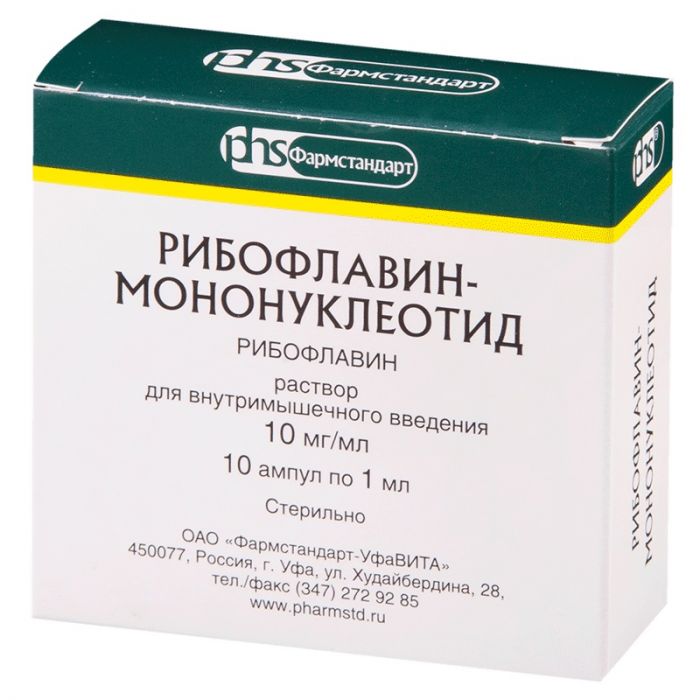riboflavin | Riboflavin mononucleotide ampoules 1%, 1 ml, 10 pcs.
Special Price
$15.68
Regular Price
$23.00
In stock
SKU
BID494882
Product form
solution for intramuscular administration
solution for intramuscular administration
Product form
solution for intramuscular administration
Pharmacological action
Vitamin B2. By regulating redox processes, it takes part in protein, fat and carbohydrate metabolism, as well as in maintaining normal visual function of the eye and in the synthesis of hemoglobin.
Pharmacokinetics
Riboflavin and its nucleotides are rapidly absorbed from the digestive tract. Chronic gastritis, enteritis, achilia slow absorption. It is unevenly distributed in the organs and tissues of the body: the largest amount is in the myocardium, liver, and kidneys. Binding to plasma proteins - 60%. Penetrates through the placental barrier, excreted in breast milk. It is excreted by the kidneys.
Indications
Hypo-and vitamin deficiency B2, hemeralopia, conjunctivitis, keratitis, iritis, corneal ulcer, cataract, long-term non-healing wounds and ulcers, general malnutrition, radiation sickness, asthenia, intestinal dysfunction, hepatitis.
Contraindications
Hypersensitivity to riboflavin, nephrolithiasis.
Special instructions
Stains urine in a light yellow color.
Composition
Active ingredient: riboflavin (in the form of a mononucleotide) 10 mg.
Dosage and administration of
Single dose - 5-10 mg, for children - 2-5 mg 1-3 for 1-1.5 months.
Side effects
Possibly: allergic reactions, impaired renal function, impaired vision
Drug Interactions
With simultaneous use with m-anticholinergic agents, the absorption and bioavailability of riboflavin are increased (due to a decrease in intestinal motility).
With simultaneous use with thyroid hormones, the metabolism of riboflavin is accelerated.
With simultaneous use, the activity of doxycycline, tetracycline, oxytetracycline, erythromycin and lincomycin decreases.
Riboflavin is incompatible with streptomycin.
With simultaneous use, side effects of chloramphenicol are reduced and prevented (hematopoiesis disturbance, optic neuritis).
With the simultaneous use of chlorpromazine, amitriptyline due to blockade of flavinokinase, they disrupt the inclusion of riboflavin in flavin adenine mononucleotide and flavin adenine dinucleotide and increase its excretion in the urine.
Storage conditions
List B: In a dry, dark place at a temperature of no higher than 25 РC.
Expiration
2 years.
Active substance
Riboflavin
pharmacy terms of prescription
Form of Treatment
simply entails dlya inaektsiy
Indications
neurodermatitis, dermatitis, Here hypovytamynoza, dermatitis, Эkzema
Pharmstandard-Ufafa, Russia
solution for intramuscular administration
Pharmacological action
Vitamin B2. By regulating redox processes, it takes part in protein, fat and carbohydrate metabolism, as well as in maintaining normal visual function of the eye and in the synthesis of hemoglobin.
Pharmacokinetics
Riboflavin and its nucleotides are rapidly absorbed from the digestive tract. Chronic gastritis, enteritis, achilia slow absorption. It is unevenly distributed in the organs and tissues of the body: the largest amount is in the myocardium, liver, and kidneys. Binding to plasma proteins - 60%. Penetrates through the placental barrier, excreted in breast milk. It is excreted by the kidneys.
Indications
Hypo-and vitamin deficiency B2, hemeralopia, conjunctivitis, keratitis, iritis, corneal ulcer, cataract, long-term non-healing wounds and ulcers, general malnutrition, radiation sickness, asthenia, intestinal dysfunction, hepatitis.
Contraindications
Hypersensitivity to riboflavin, nephrolithiasis.
Special instructions
Stains urine in a light yellow color.
Composition
Active ingredient: riboflavin (in the form of a mononucleotide) 10 mg.
Dosage and administration of
Single dose - 5-10 mg, for children - 2-5 mg 1-3 for 1-1.5 months.
Side effects
Possibly: allergic reactions, impaired renal function, impaired vision
Drug Interactions
With simultaneous use with m-anticholinergic agents, the absorption and bioavailability of riboflavin are increased (due to a decrease in intestinal motility).
With simultaneous use with thyroid hormones, the metabolism of riboflavin is accelerated.
With simultaneous use, the activity of doxycycline, tetracycline, oxytetracycline, erythromycin and lincomycin decreases.
Riboflavin is incompatible with streptomycin.
With simultaneous use, side effects of chloramphenicol are reduced and prevented (hematopoiesis disturbance, optic neuritis).
With the simultaneous use of chlorpromazine, amitriptyline due to blockade of flavinokinase, they disrupt the inclusion of riboflavin in flavin adenine mononucleotide and flavin adenine dinucleotide and increase its excretion in the urine.
Storage conditions
List B: In a dry, dark place at a temperature of no higher than 25 РC.
Expiration
2 years.
Active substance
Riboflavin
pharmacy terms of prescription
Form of Treatment
simply entails dlya inaektsiy
Indications
neurodermatitis, dermatitis, Here hypovytamynoza, dermatitis, Эkzema
Pharmstandard-Ufafa, Russia
Write Your Own Review

